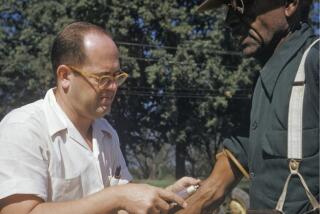White America Needs Its Bigotry
- Share via
The horrific death of James Byrd Jr. has focused attention on the persistence of racism and the need for racial healing. Byrd, who police say was dragged to his death behind the pickup truck of white supremacists in Texas, was essentially lynched.
What most black folks know that most white folks do not is that we still live in a deeply racist culture. Incidents of racist violence such as that visited upon Byrd illustrate that. That so many people came together at Byrd’s funeral to deplore racism is a very good thing. But the way this incident is understood also presents certain dangers.
Most white people think that racism today is limited to a few crazy extremists such as those who allegedly killed Byrd. We still associate racism with the Ku Klux Klan, with a lunatic fringe that is still fighting the Civil War, with white separatist militias, with bigots in the Deep South.
Average white people don’t think that they are racists. Because they would never utter the “n-word” or eat in segregated restaurants or teach their children explicitly that black people are inferior, they believe that they cannot be prejudiced. When public opinion surveys are taken, almost no one responds with what are considered to be racist views, which has led some “experts” to conclude that Americans have overcome their legacy of racial injustice.
The truth is much uglier than that. The civil rights movement did not end racism in this country. What it did was teach white folks how not to appear to be racists, not even to themselves. White people learned not to say the wrong words, learned not to try to produce segregation by armed force, learned not to post signs that say “whites only.”
Meanwhile, American cities and schools continue in fact to be segregated. There continues to be a huge disparity between the incomes and employment prospects of the races. And white Americans continue to harbor the attitudes that preserve these conditions.
When white Americans think of violent crime, for example, they usually think of black men. And when white politicians want to talk about race, they don’t hurl racial epithets; they talk about “crime” or “welfare.”
Because racist talk is unacceptable, our cultural discourse about race proceeds in code. That does nothing to solve the fundamental problem; it only makes that problem extremely elusive.
With a bigot, you know where you stand. But what do you do when someone smiles in your face and doesn’t hire you? Or denies their racism, then follows you around their store because they think you are a shoplifter?
We white folks have convinced ourselves that we can’t be racists because we don’t say the wrong words. That means that the ongoing problems of African American communities cannot be caused by racism; they must be caused by the residents of those communities themselves. White America is committed to a massive collective delusion that allows us effortlessly to blame the victim.
White Americans continue to benefit in the most concrete ways from the results of racism. To begin with, the poor state of education in inner cities creates a pool of cheap labor; black and brown folks often perform cheaply the labor white people do not want to perform.
There are also less concrete benefits--psychological ones. White folks’ images of blacks as violent, ignorant and highly sexual (think of the stereotype of the “welfare queen”: black, reproducing continually and irresponsibly), allow whites to construct an image of themselves as civilized, well-informed and self-controlled.
White Americans’ image of themselves is constructed through their exclusion of black people. White people take themselves to be the opposite of whatever they think black people are. Thus white people only understand themselves in what they exclude or segregate from themselves.
This process is as strong now as it ever has been. The basic racism of American culture has not even been addressed, much less solved. Everyone should deplore Byrd’s lynching. But it is easy to deplore lynching. It is much harder to do anything about the central, subtle racism that surrounds us.
More to Read
Sign up for Essential California
The most important California stories and recommendations in your inbox every morning.
You may occasionally receive promotional content from the Los Angeles Times.










